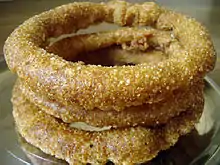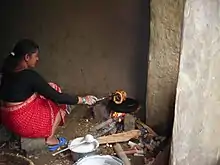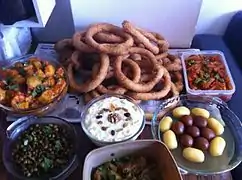Sel roti
Sel roti (Nepali: सेल रोटी) is a traditional Nepalese[1] ring-shaped sweet fried dough made from rice flour.[2] It is mostly prepared during Dashain and Tihar, widely celebrated Hindu festivals in Nepal as well as Darjeeling, Kalimpong and Sikkim regions in India. The dish is popular throughout Nepal and among the Indian Gorkha community. Sel roti is made from a batter of rice flour, water sugar, ghee, and spices which is then deep-fried in cooking oil.
 | |
| Type | Fried dough |
|---|---|
| Course | Breakfast, lunch, dinner, snack |
| Place of origin | Nepal |
| Associated cuisine | Nepalese cuisine |
| Main ingredients | Rice flour, water, sugar, ghee |
| Ingredients generally used | Cardamom, clove |
| Variations | Singhal (Kumaon) |
Origin and etymology
Dinesh Raj Panta, a professor at Nepal Sanskrit University estimates this dish to be over 800 years old. According to Madhulika Dash, an Indian food columnist, the dish was made bland many years ago, without sugar and spices. Over the years with intermingling of various ethnicities of Nepal, the dish has reached in its modern form.[3] Dash also estimates that sel roti may have been a modified form of Babari, a Nepalese rice pancake. Babari is made of the same batter but is cooked like a pancake on a shallow griddle while sel roti is ring shaped and deep fried on a karahi.
The name of the dish is assumed to be derived from Sel, a variety of rice that grows in the foothills of Nepal. Roti in Nepali translates to bread. Another theory also suggests that the name of the dish is from Saal, Nepali word for year. Since the dish was developed to be a ceremonial dish made on Nepalese new year, it may have been called Saal roti, which later had become Sel roti.[4]
Preparation and ingredients

It is made of rice flour with added flavours. A batter is prepared by adding water, sugar, and ghee to roughly grinded rice flour. The ghee can also be substituted by cooking oil or butter. Spices such as cardamom and clove could also be added to the batter.[5] The ingredients are then let to rest for a couple of hours. Once the batter is set, it is deep fried in cooking oil or ghee.[6] Instead of water, milk can also be used to prepare the batter. However, using milk can reduce the shelf life of the dish.

The dough is poured by hand in a ring shape into boiling oil and cooked on medium heat (around 348 °F to 373 °F) until it turns light brown on both sides. Two metallic or wooden sticks (known as jhir in Nepali language), each about 1 foot (30 cm) long, are used for turning the dough while cooking.[7]
Sel roti are cooked in bulk and can be stored at room temperature for least 20 days. Sel roti are often sent as special gifts to family members living away from home or used as prasada, a religious offering.[8]
Occasions and variations
Sel roti is a delicacy, made mainly for the great Nepali celebration of the Dashain and Tihar festivals.[9] It is unique to Nepal and has become an iconic symbol of Nepali culture and festivities, and is made and served throughout the country during festivals as well as during wedding parties, and other ceremonies.
It is also a traditional food in Nepali-speaking communities in Darjeeling, Sikkim, Siliguri and Kalimpong regions of India and southern Bhutan. It is an essential food at most Nepalese and Kumaoni cultural and traditional events.[10] Instead of traditional single ring shape, in Sikkim, Darjeeling and Kalimpong areas, Sel roti is also made in double ring shape.
Singhal, a dish from Kumaon region in Uttarakhand state of India, is similar to Sel roti but while Sel roti is made from rice flour, Singhal is prepared from semolina flour.[11]
Gallery
 Sel roti
Sel roti Stacks of cooked sel roti
Stacks of cooked sel roti Sel roti with various Nepalese curries and sweets
Sel roti with various Nepalese curries and sweets
References
- "Sel roti: Cook Nepal's iconic dish a yummy way - OnlineKhabar English News". Online Khabar. 2021-09-19. Retrieved 2022-09-07.
- "You don't have to be a Nepali to learn to make selroti". kathmandupost.com. Retrieved 2022-02-12.
- "Getting to know selroti". kathmandupost.com. Retrieved 2022-08-18.
- "Bawarchi | Sel Roti: The ancient pancake that became a donut". Bawarchi. Retrieved 2022-08-18.
- "Archived copy". Archived from the original on 2011-07-14. Retrieved 2010-11-06.
{{cite web}}: CS1 maint: archived copy as title (link) - "Try a recipe of Selroti to mark the Nepali festival Dashain". Mintlounge. 2021-10-12. Retrieved 2022-02-12.
- Nepali Brihat Sabdhakosh 7th ed. Kamaladi Kathmandu: Praygya Pratisthan. p. 1299.
- "Sel Roti: The Nepali Doughnut That Is Infinitely Yummy". NDTV Food. Retrieved 2022-02-12.
- "8 best Nepali food items that you should have as snacks in modern times too - OnlineKhabar English News". September 2021. Retrieved 2022-02-12.
- Sel Roti We All Nepali
- Pal, Sanchari (2016-06-17). "Food Secrets: On The Trail Of Kumaon's Culinary Wonders". The Better India. Retrieved 2022-08-18.
External links
 Media related to Selroti at Wikimedia Commons
Media related to Selroti at Wikimedia Commons